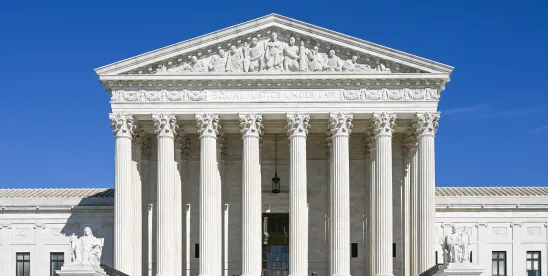On July 22, 2024, Solicitor General of the United States Elizabeth B. Prelogar submitted applications to the Supreme Court of the United States for a partial stay of two preliminary injunctions issued, respectively, by the U.S. District Court for the Western District of Louisiana on June 13, 2024 (affirmed by the Fifth Circuit Court of Appeals on July 17, 2024) and by the U.S. District Court for the Eastern District of Kentucky on June 17, 2024 (affirmed by the Sixth Circuit Court of Appeals on July 17, 2024).
The circuit court decisions and the applications for a partial stay (Nos. 24A78 and 24A79) address a new rule (“the Rule”) issued in April 2024 to implement Title IX, which prohibits sex discrimination in federally funded education programs. The applications request a partial stay “pending the consideration and disposition of the government’s appeal[s] to the United States Court[s] of Appeals … and, if the court[s] … affirm[] the injunction[s], pending any … further proceedings” in the Supreme Court. This signals the U.S. Department of Education’s intent to defend (and subsequently enforce) the new regulations on their merits all the way to the Supreme Court.
Quick Hits
- As previously discussed, the various states (and other parties) that challenged the Rule did not challenge most of the regulatory changes. Rather, the respondents object to three provisions related to discrimination against transgender individuals. Those three provisions stipulate that (1) Title IX’s prohibition on sex-based discrimination includes discrimination based on gender identity (34 C.F.R. § 106.10); (2) schools violate Title IX if they prohibit transgender individuals from using facilities consistent with their gender identity (34 C.F.R. § 106.31(a)(2)); and (3) the definition of “hostile environment harassment” includes harassment based on gender identity (34 C.F.R. § 106.2).
- The district courts held that the respondents’ challenges to the three provisions were likely to succeed and issued a preliminary injunction, enjoining enforcement of the entire Rule instead of just the three challenged provisions.
- According to the applications, the injunctions included “dozens of provisions that respondents had not challenged and that the court[s] did not … find likely invalid.”
Background and Procedural History
The crux of the applications is that the district court refused to tailor the injunctions to the two provisions of the Rule that are the source of the respondents’ asserted injuries, or even the three provisions that the respondents challenged on the merits. The Rule makes numerous changes to existing regulations, but the vast majority of these changes were not challenged in the district court litigation. According to the applications, at the appellate level, the Department did not seek to stay the injunctions insofar as they covered the two provisions that are the source of the respondents’ asserted injuries (i.e., Section 106.31(a) (2) and the application of Section 106.2’s definition of hostile-environment harassment to discrimination based on gender identity). Instead, the Department sought a stay of the injunctions only to the extent that the injunctions bar implementation of the remainder of the Rule. Divided appellate court panels denied the Department’s requested relief, and these applications followed.
The Arguments for a Partial Stay
The Department seeks a partial stay of the injunctions, seeking to implement all parts of the Rule except for the two provisions directly related to the respondents’ claimed harms (i.e., Section 106.31(a)(2) and the application of Section 106.2 to gender identity discrimination). To that end, the Department asserts the following arguments:
- Overbroad injunction. The district court erred by enjoining dozens of provisions that were not challenged and not found likely to be unlawful. This violates the principle that injunctive relief should be no broader than necessary to address the alleged injuries.
- Misapplication of Bostock v. Clayton County, Georgia, 590 U.S. 644 (2020) (case decided under Title VII). The district court erred in enjoining Section 106.10’s inclusion of gender identity discrimination. This provision follows directly from the Bostock decision, which held that discrimination based on gender identity is necessarily a form of sex discrimination.
- Severability. The Rule explicitly states that its provisions are intended to operate independently. Enjoining unchallenged provisions goes against this clear severability instruction.
- Balance of equities. A partial stay would not harm the respondents, as it would leave in place the injunction as it relates to the specific provisions they challenged. In contrast, the sweeping injunction causes direct harm to the government’s ability to enforce important civil rights protections.
The Circuit Courts denied the Department’s requests for a partial stay of the injunctions, holding that the possibility of a more limited injunction had not been adequately identified to the district court by the government and that it would be difficult to parse which provisions of the Rule could be implemented separately.
Status of the Stay Applications
On July 26, 2024, the respondent parties in the cases filed responses to the applications. In addition, two amicus curiae filed briefs in support of the applications. On July 29, 2024, the Department filed replies.
READ






 />i
/>i

